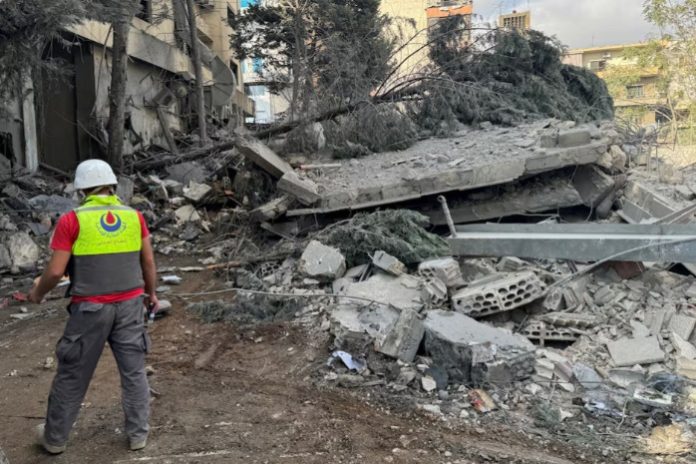Israel continues to launch deadly strikes in Lebanon as international organisations warn of the spread of cholera and the risk of famine in the region due to the fighting.
UN Troops in Lebanon can shoot back at Israel
UN peacekeepers fired upon by Israel can return fire under a 2006 UN Security Council resolution.
Paragraph 12 of Resolution 1701, which helped end the 33-day conflict between Israel and Hezbollah in 2006, states that the UN Interim Force in Lebanon (UNIFIL):
Acting in support of a request from the Government of Lebanon to deploy an international force to assist it to exercise its authority throughout the territory, authorizes UNIFIL to take all necessary action in areas of deployment of its forces and as it deems within its capabilities, to ensure that its area of operations is not utilized for hostile activities of any kind, to resist attempts by forceful means to prevent it from discharging its duties under the mandate of the Security Council, and to protect United Nations personnel, facilities, installations and equipment …
The repeated attacks by the Israel Defence Forces (IDF) that began last week and continued at least through Sunday fit the description of “hostile activity” in UNIFIL’s “areas of deployment.”
While the unanimous resolution did not pass under Chapter 7 of the UN Charter, which allows UN troops to use force to carry out their mandate – including in this case to disarm combatants including Hezbollah – all UN peacekeeping operations retain the right to use force in self-defence. UNIFIL said in a statement during the adoption of Resolution 1701:
UNIFIL commanders have sufficient authority to act forcefully when confronted with hostile activity of any kind.
Israeli strikes level buildings across Lebanon
An Israeli attack on Lebanon on Wednesday destroyed buildings and killed the city’s mayor, while hours earlier, Israeli strikes were reported in Syria and Gaza.
A rare Israeli strike Thursday on the Syrian port city of Latakia targeted an arms depot, the Syrian Observatory for Human Rights said. The Israeli military, which did not comment on the attack, accuses Hezbollah of moving weapons into Lebanon via neighbouring Syria.
Israel stepped up its bombardment of Lebanon in late September and by the end of the month had moved ground troops across the border.
The military said its warplanes struck dozens of Hezbollah targets on Wednesday in the southern Lebanese city of Nabatiyeh, where Hezbollah and its ally Amal hold sway.
Lebanon’s Health Ministry said 16 people were killed and 52 wounded in the strikes on two municipal buildings. Officials said at least six people were killed in other strikes. Local officials said the mayor of the city of Nabatiyeh was among the dead.
Prime Minister Najib Mikati said Israel “deliberately targeted a municipal council meeting to discuss the city’s services and aid situation.”
Meanwhile, the World Health Organisation (WHO) has warned that there is a “very high” risk of cholera spreading among displaced people in Lebanon, confirming one case of the potentially deadly infection this week.
Lebanon’s war has killed at least 1,373 people in Lebanon, according to the Lebanese health ministry, although the actual number of casualties is likely higher. Iran-backed Hezbollah began launching low-intensity strikes against Israel last October in support of Hamas following its October 7 attack that triggered the Gaza war.
Jean-Luc Mélenchon, leader of France Unbowed (LFI), gave his commentary on Israel’s actions:
The genocide in Gaza on Netanyahu’s orders and his invasion of Lebanon are crimes that go beyond politics. They are a crime against humanity. #StopGenocide
UNRWA chief warns of “real risk” of famine in Gaza
The head of the UN agency for Palestinian refugees warned on Wednesday of the risk of famine in Gaza, a day after the US said Israel had been asked to improve aid deliveries to the territory.
UNRWA chief Philippe Lazzarini told a news conference in Berlin that “there is a real risk today … that we are entering a situation where famine or acute malnutrition is unfortunately becoming likely again” pointing to the coming winter and the weakened immune system of the people of Gaza.
Israel has stepped up operations in the north of the besieged Palestinian territory, where the UN has warned hundreds of thousands of people are trapped.
Lazzarini painted a dire picture of the humanitarian situation in Gaza, saying it had “turned into a kind of wasteland that I would say is almost uninhabitable.” As for the delivery of aid to Gaza, he said that “there has not been a single convoy to the north in the last two or three weeks, except for yesterday.” He also added:
We have a huge drop of convoys in the south with only an average of fifty to sixty for two million people, while we estimate the number needed is much, much higher.
Lazzarini noted that those convoys that managed to enter the country were subjected to looting “because of the complete breakdown of law and order.” Nevertheless, he emphasised that with appropriate measures, the famine crisis in Gaza “can be avoided” by allowing convoys and food to enter the country. He asked:
We have shown that we can have a polio campaign, so why can we not bring food?
COGAT, the Israeli military body that oversees civil affairs in the Palestinian territories, said on Wednesday that “50 truckloads of humanitarian aid, including food, water, medicine and housing equipment provided by Jordan, were transferred to northern Gaza today.”
